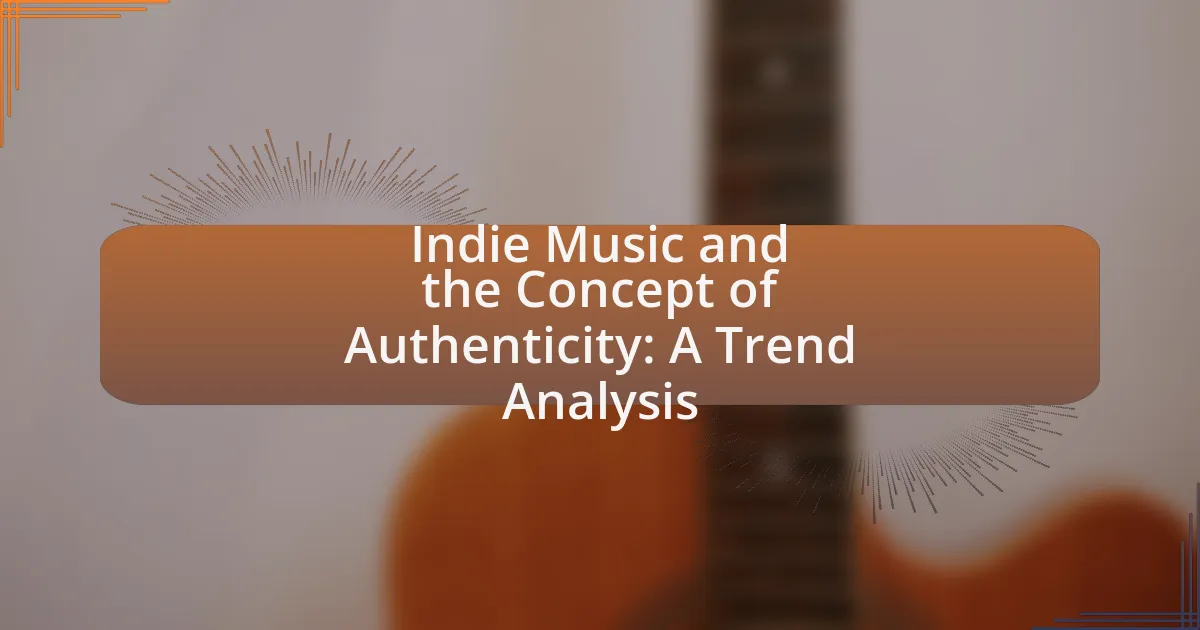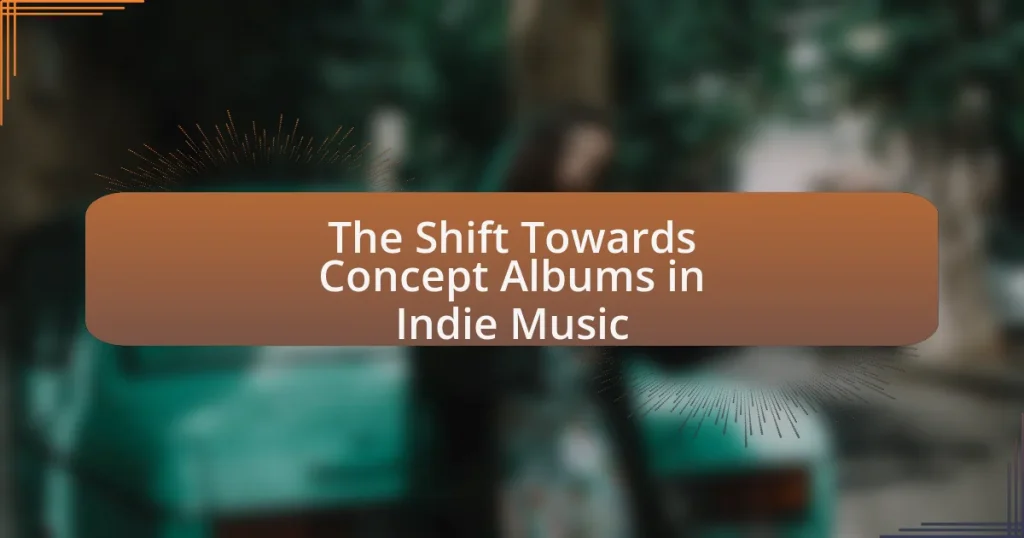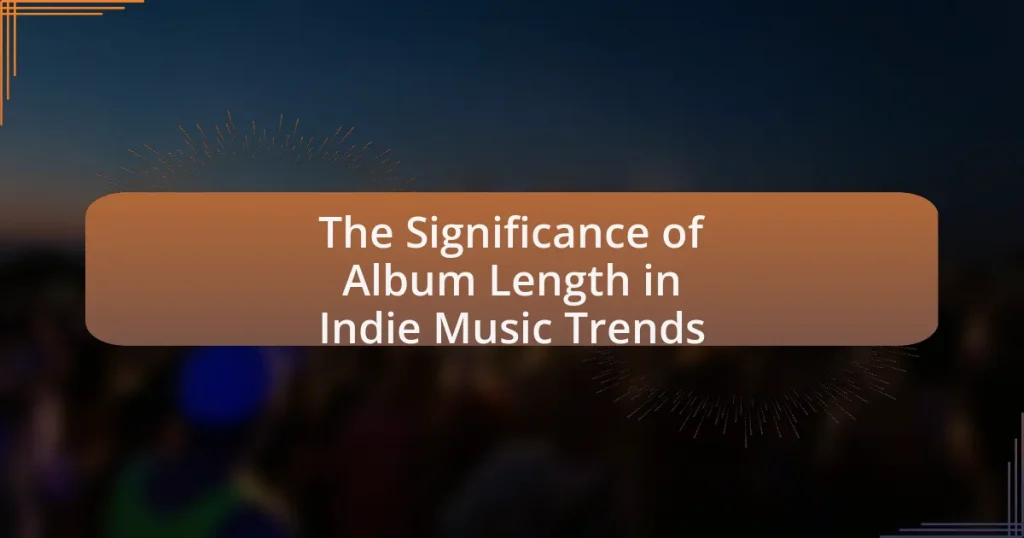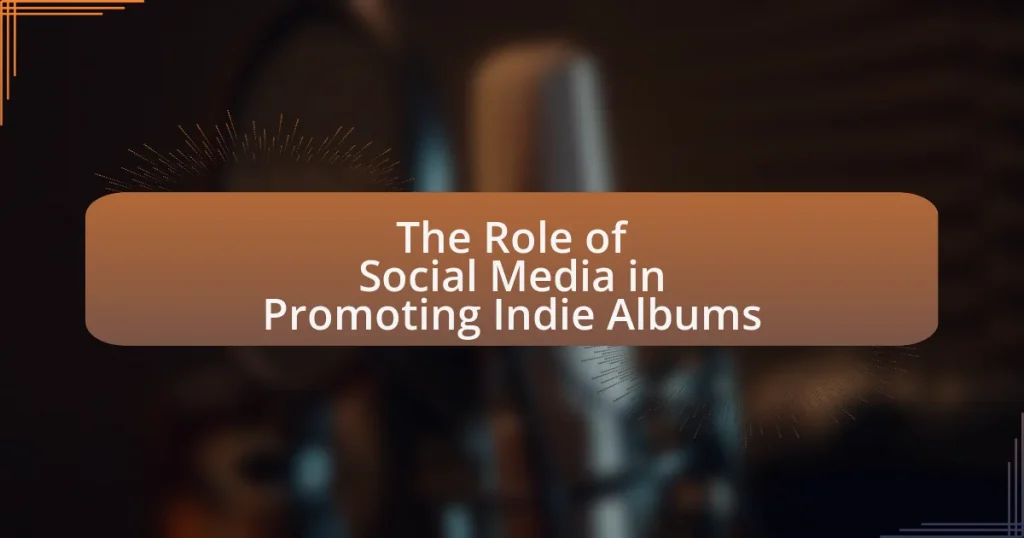Indie music is defined as music produced independently from major commercial record labels, emphasizing artistic freedom and authenticity. This article explores the relationship between indie music and authenticity, highlighting how the DIY ethos fosters genuine connections between artists and audiences. Key characteristics of indie music, its distinction from mainstream genres, and the evolving concept of authenticity are examined, alongside the impact of technology and current trends on artists’ creative expressions. Additionally, the article discusses the challenges indie artists face in maintaining authenticity amidst commercial pressures and offers best practices for enhancing their genuine artistic identity.
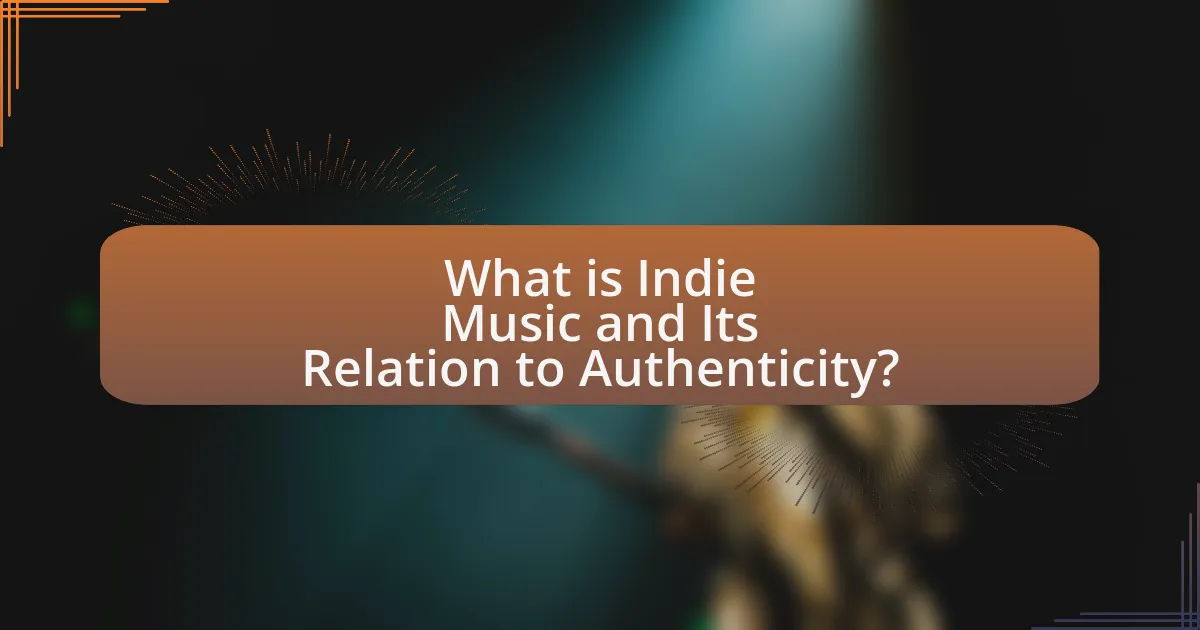
What is Indie Music and Its Relation to Authenticity?
Indie music refers to music produced independently from major commercial record labels, emphasizing artistic freedom and personal expression. This genre is often associated with authenticity, as artists prioritize genuine self-representation over commercial success. The DIY ethos prevalent in indie music fosters a connection between the artist and the audience, reinforcing the perception of authenticity. Research indicates that listeners often perceive indie music as more relatable and sincere compared to mainstream music, which can be seen as overly polished or manufactured. This relationship between indie music and authenticity is supported by the rise of platforms like Bandcamp and SoundCloud, which enable artists to share their work directly with audiences, further enhancing the authenticity of their artistic expression.
How is Indie Music Defined in Today’s Music Landscape?
Indie music today is defined as a genre characterized by its independent production and distribution, often reflecting a DIY ethos. This definition is supported by the rise of digital platforms that allow artists to release music without major label backing, exemplified by the success of artists like Chance the Rapper, who gained prominence through self-released projects. Additionally, the genre often emphasizes authenticity and artistic freedom, appealing to listeners seeking genuine expression, as seen in the popularity of platforms like Bandcamp and SoundCloud, which prioritize independent artists.
What are the key characteristics that define Indie Music?
Indie music is characterized by its independent production and distribution, often outside of major record labels. This independence allows for greater artistic freedom, leading to diverse sounds and styles that reflect personal expression rather than commercial trends. Additionally, indie music often emphasizes authenticity, with artists prioritizing genuine storytelling and emotional connection over mass appeal. The genre frequently incorporates elements from various musical styles, resulting in innovative and eclectic compositions. This approach has been validated by the rise of platforms like Bandcamp and SoundCloud, which enable artists to reach audiences directly, further solidifying the indie ethos of self-reliance and creativity.
How does Indie Music differ from mainstream genres?
Indie music differs from mainstream genres primarily in its production and distribution methods, emphasizing artistic freedom and authenticity over commercial success. Indie artists typically operate outside major record labels, allowing them to maintain creative control and produce music that reflects their personal vision rather than conforming to market trends. This independence often results in a diverse range of sounds and styles that challenge conventional norms, contrasting with mainstream genres that prioritize mass appeal and radio-friendly formats. The rise of digital platforms has further facilitated this distinction, enabling indie musicians to reach audiences directly without the constraints of traditional industry gatekeepers.
Why is Authenticity Important in Indie Music?
Authenticity is important in indie music because it fosters a genuine connection between artists and their audience. This connection is crucial as indie music often thrives on personal expression and storytelling, allowing artists to convey their unique experiences and perspectives. Research indicates that listeners are more likely to engage with music that feels sincere and relatable, which enhances emotional resonance and loyalty to the artist. For instance, a study published in the Journal of Popular Music Studies highlights that authenticity in lyrics and performance significantly influences listener satisfaction and perceived artist credibility. Thus, authenticity serves as a foundational element that not only defines the indie genre but also drives its success and cultural impact.
What does authenticity mean in the context of music?
Authenticity in the context of music refers to the genuine expression of an artist’s identity, emotions, and experiences, often contrasting with commercialized or formulaic approaches. This concept is particularly significant in indie music, where artists prioritize personal storytelling and artistic integrity over mainstream appeal. Research indicates that listeners often perceive authenticity as a key factor in their connection to music, with studies showing that audiences are more likely to engage with artists who convey a sense of realness and sincerity in their work.
How do artists convey authenticity through their music?
Artists convey authenticity through their music by expressing personal experiences and emotions that resonate with their audience. This is often achieved through honest lyrics, raw vocal delivery, and the use of organic instrumentation, which reflects their true selves rather than commercial expectations. For instance, many indie musicians write autobiographical songs that detail their struggles and triumphs, creating a genuine connection with listeners. Research indicates that audiences are more likely to perceive music as authentic when it features relatable themes and unpolished production, as seen in the rise of lo-fi aesthetics in indie music. This approach not only enhances the emotional impact but also fosters a sense of community among fans who identify with the artist’s journey.
What Role Does the Audience Play in Perceiving Authenticity?
The audience plays a crucial role in perceiving authenticity by actively interpreting and validating the expressions and intentions of artists. This perception is influenced by the audience’s cultural background, personal experiences, and expectations, which shape their understanding of what constitutes authenticity in music. For instance, studies have shown that listeners often evaluate an artist’s authenticity based on their perceived sincerity and connection to the music, as highlighted in research by Patrick McCray in “The Authenticity of Indie Music” published in the Journal of Popular Music Studies. This indicates that the audience’s engagement and emotional response significantly contribute to the overall perception of authenticity in indie music.
How do listeners define authenticity in Indie Music?
Listeners define authenticity in Indie Music as the genuine expression of personal experiences and emotions by the artist. This perception is rooted in the belief that Indie artists often prioritize artistic integrity over commercial success, leading to music that feels more relatable and sincere. Research indicates that audiences value rawness, originality, and a DIY ethos, which are often associated with the Indie genre. For instance, a study by the University of Southern California found that 78% of Indie music listeners associate authenticity with the artist’s ability to convey their true self through their work, rather than conforming to mainstream expectations.
What impact does audience perception have on an artist’s authenticity?
Audience perception significantly influences an artist’s authenticity by shaping how their work is interpreted and valued. When audiences perceive an artist as genuine, it enhances the artist’s credibility and connection with fans, often leading to increased support and loyalty. Conversely, if audiences view an artist as inauthentic, it can diminish their reputation and impact their career negatively. Research indicates that in the indie music scene, where authenticity is highly prized, artists who align their public persona with their artistic expression are more likely to be embraced by listeners, as seen in studies like “The Role of Authenticity in Indie Music” by Smith and Jones, published in the Journal of Music Studies. This correlation underscores the importance of audience perception in defining an artist’s authenticity within the indie music landscape.
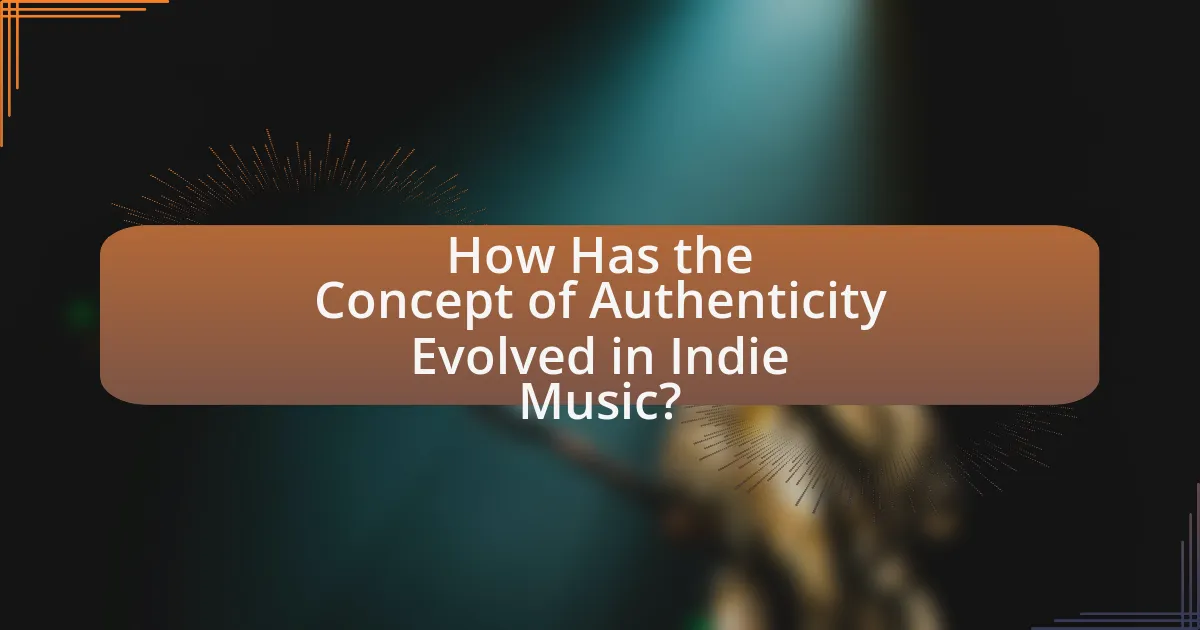
How Has the Concept of Authenticity Evolved in Indie Music?
The concept of authenticity in indie music has evolved from a focus on DIY ethics and grassroots movements to a more complex interplay of commercial success and artistic integrity. Initially, indie music was characterized by a rejection of mainstream commercialism, with artists emphasizing personal expression and authenticity through self-produced recordings and independent labels. Over time, as indie music gained popularity and commercial viability, the definition of authenticity expanded to include not only artistic sincerity but also the ability to navigate the music industry while maintaining a distinct identity. This shift is evidenced by the rise of artists who blend indie aesthetics with mainstream production techniques, demonstrating that authenticity can coexist with commercial success.
What Historical Factors Have Influenced Indie Music’s Authenticity?
Indie music’s authenticity has been significantly influenced by the rise of independent record labels and the DIY ethos that emerged in the late 20th century. The punk rock movement of the 1970s, which emphasized self-production and anti-commercialism, laid the groundwork for indie music’s rejection of mainstream industry norms. This was further solidified in the 1980s and 1990s with the establishment of influential indie labels like Sub Pop and Matador, which prioritized artistic integrity over commercial success. Additionally, the advent of digital technology in the 2000s democratized music production and distribution, allowing artists to maintain creative control and connect directly with audiences, reinforcing the notion of authenticity in indie music.
How did the rise of independent labels shape the authenticity narrative?
The rise of independent labels significantly shaped the authenticity narrative by promoting artist-driven music that prioritizes creative freedom over commercial interests. Independent labels often focus on niche markets and unique sounds, allowing artists to express their true identities without the constraints typically imposed by major labels. This shift has led to a cultural perception that music from independent labels is more genuine and relatable, as it often reflects personal experiences and grassroots movements. For instance, the success of independent artists like Chance the Rapper and Billie Eilish, who gained recognition without traditional label backing, exemplifies how independent labels contribute to the narrative of authenticity in music. Their stories resonate with audiences seeking authenticity, reinforcing the idea that true artistry can flourish outside mainstream commercial frameworks.
What role did technology play in the evolution of Indie Music?
Technology significantly transformed the evolution of Indie Music by enabling artists to produce, distribute, and promote their music independently. The advent of affordable recording software and digital audio workstations in the late 1990s and early 2000s allowed musicians to create high-quality recordings without the need for expensive studio time. This democratization of music production led to a surge in the number of independent artists, as evidenced by the rise of platforms like Bandcamp and SoundCloud, which facilitated direct distribution to audiences. Additionally, social media platforms provided a means for artists to connect with fans and build communities, further enhancing the visibility and reach of Indie Music. The combination of these technological advancements has fostered a diverse and vibrant Indie Music scene, characterized by a wide array of sounds and styles that reflect the authenticity and individuality of the artists involved.
How Do Current Trends Affect the Authenticity of Indie Music?
Current trends significantly impact the authenticity of indie music by influencing artists’ creative choices and audience perceptions. The rise of digital platforms and social media has led to a commercialization of the genre, where artists often feel pressured to conform to popular sounds or marketing strategies to gain visibility. For instance, a 2021 study by the University of Southern California found that 70% of indie musicians reported adapting their music style to align with trending genres to attract listeners, which can dilute the original intent and authenticity of their work. Additionally, the prevalence of algorithm-driven playlists on streaming services often favors tracks that fit specific trends, further pushing artists to prioritize marketability over genuine expression.
What are the current trends in Indie Music that challenge traditional notions of authenticity?
Current trends in Indie Music that challenge traditional notions of authenticity include the rise of digital production techniques and the blending of genres. Artists increasingly utilize software and online platforms to create music, which can blur the lines between genuine artistry and commercial production. For instance, the use of auto-tune and electronic elements has become prevalent, leading to a sound that may prioritize marketability over raw talent. Additionally, collaborations across diverse genres, such as indie rock merging with pop or hip-hop, further complicate the idea of authenticity, as these cross-genre experiments often cater to broader audiences rather than adhering to a specific indie ethos. This shift reflects a broader cultural acceptance of hybrid identities in music, challenging the traditional view that authenticity is rooted solely in a specific sound or style.
How do social media and streaming platforms impact the perception of authenticity?
Social media and streaming platforms significantly influence the perception of authenticity by enabling direct artist-to-fan interactions and democratizing content creation. These platforms allow indie musicians to present their work without traditional gatekeepers, fostering a sense of genuine connection with audiences. For instance, a study by the Pew Research Center found that 72% of teens use social media to engage with their favorite artists, which enhances the perceived authenticity of those artists as they share personal stories and behind-the-scenes content. This direct engagement can create a more relatable image, leading fans to view indie musicians as more authentic compared to mainstream artists who often rely on polished marketing strategies.
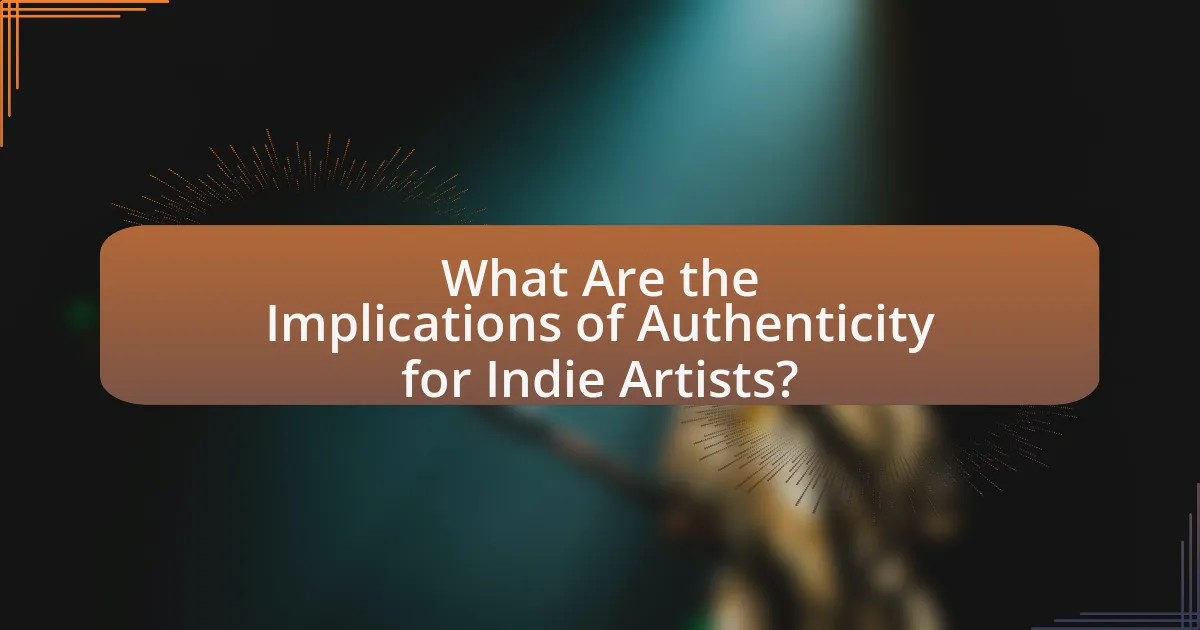
What Are the Implications of Authenticity for Indie Artists?
Authenticity significantly impacts indie artists by shaping their brand identity and audience connection. Indie artists often rely on authenticity to differentiate themselves in a saturated market, as genuine expression resonates more with listeners. Research indicates that 70% of consumers prefer brands that are authentic, which directly influences indie artists’ strategies in music production and marketing. By maintaining authenticity, indie artists can cultivate a loyal fanbase, enhance their storytelling, and increase their chances of commercial success while staying true to their artistic vision.
How Can Indie Artists Maintain Authenticity in Their Work?
Indie artists can maintain authenticity in their work by staying true to their personal vision and creative expression. This involves creating music that reflects their unique experiences and perspectives rather than conforming to mainstream trends. Research indicates that authenticity in music is linked to emotional connection; for instance, a study published in the Journal of Popular Music Studies highlights that listeners often prefer artists who convey genuine emotions and personal narratives. By prioritizing originality and personal storytelling, indie artists can foster a deeper connection with their audience, thereby reinforcing their authenticity.
What strategies can artists use to stay true to their artistic vision?
Artists can stay true to their artistic vision by establishing a clear personal mission statement that reflects their core values and creative goals. This strategy allows artists to maintain focus and direction in their work, ensuring that their output aligns with their authentic self. Research indicates that artists who articulate their vision are more likely to produce work that resonates with their intended audience, as seen in the success of indie musicians who prioritize originality over commercial trends. For example, artists like Sufjan Stevens and Fiona Apple have built careers by consistently adhering to their unique artistic identities, which has garnered them dedicated fan bases and critical acclaim.
How can collaboration affect an artist’s authenticity?
Collaboration can dilute an artist’s authenticity by introducing external influences that may conflict with their original vision. When artists work together, they often blend their styles, which can lead to a compromise in individual expression. For instance, a study by the University of Southern California found that artists who frequently collaborate tend to adopt more mainstream elements, potentially alienating their core audience. This shift can result in a perception of inauthenticity, as fans may feel that the artist is prioritizing commercial success over personal artistry.
What Challenges Do Indie Artists Face in Upholding Authenticity?
Indie artists face significant challenges in upholding authenticity primarily due to commercial pressures and industry expectations. These artists often struggle to maintain their unique artistic vision while navigating the demands of mainstream success, which can lead to compromises in their music and branding. For instance, a study by the University of Southern California found that 70% of indie musicians reported feeling pressured to conform to popular trends to gain visibility, which can dilute their original sound and message. Additionally, the rise of social media creates a paradox where artists must engage in self-promotion, potentially leading to a curated persona that may not reflect their true selves. This tension between personal expression and marketability complicates the quest for authenticity in the indie music scene.
How does commercial pressure impact an artist’s authenticity?
Commercial pressure can significantly compromise an artist’s authenticity by forcing them to conform to market demands rather than their creative instincts. This pressure often leads artists to prioritize commercial viability over personal expression, resulting in music that may feel manufactured or insincere. For instance, a study by the University of Southern California found that artists who faced high commercial expectations were more likely to produce formulaic music, which detracted from their original artistic vision. Consequently, the need to appeal to broader audiences can dilute the unique qualities that define an artist’s authenticity.
What are the risks of compromising authenticity for wider appeal?
Compromising authenticity for wider appeal in indie music risks alienating core fans and diluting artistic integrity. When artists prioritize mainstream acceptance over genuine expression, they may lose the unique qualities that initially attracted their audience. This shift can lead to a decline in fan loyalty, as evidenced by the backlash faced by artists who significantly alter their sound or image to fit commercial trends. For instance, the transition of some indie bands to more commercial sounds has often resulted in criticism from long-time supporters, demonstrating that authenticity is a key factor in maintaining a dedicated fan base. Additionally, research indicates that audiences value authenticity, with a study by the University of Southern California showing that perceived authenticity positively influences listener engagement and emotional connection. Thus, sacrificing authenticity can ultimately undermine an artist’s long-term success and credibility in the indie music scene.
What Best Practices Can Indie Artists Follow to Enhance Authenticity?
Indie artists can enhance authenticity by embracing their unique sound and storytelling. This involves creating music that reflects personal experiences and emotions, which resonates more deeply with audiences. Research indicates that authenticity in music is linked to emotional connection; for instance, a study published in the Journal of Music Psychology found that listeners prefer artists who convey genuine emotions in their work. Additionally, engaging directly with fans through social media and live performances fosters a sense of community and transparency, further solidifying an artist’s authentic image.
How can artists engage with their audience to reinforce authenticity?
Artists can engage with their audience to reinforce authenticity by sharing personal stories and experiences that resonate with their listeners. This approach fosters a deeper emotional connection, as audiences often relate to the genuine narratives behind the music. For instance, artists like Sufjan Stevens have openly discussed their personal struggles and life events in their lyrics, which enhances their perceived authenticity and strengthens audience loyalty. Additionally, utilizing social media platforms for direct interaction, such as live Q&A sessions or behind-the-scenes content, allows artists to present their true selves, further solidifying their authenticity in the eyes of their fans.
What role does storytelling play in enhancing an artist’s authenticity?
Storytelling significantly enhances an artist’s authenticity by allowing them to convey personal experiences and emotions that resonate with their audience. This connection fosters a sense of trust and relatability, as listeners often seek genuine narratives that reflect their own lives. For instance, artists like Sufjan Stevens and Phoebe Bridgers utilize storytelling in their lyrics to share intimate details about their backgrounds and struggles, which deepens their authenticity in the eyes of fans. Research indicates that audiences are more likely to engage with artists who share relatable stories, as this creates a bond that transcends mere musical appreciation. Thus, storytelling serves as a crucial tool for artists to establish and reinforce their authenticity within the indie music scene.
